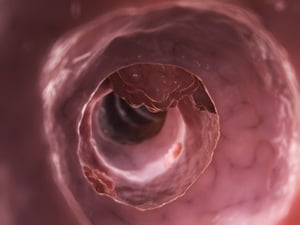
Analysing the composition of people's collection of gut bacteria – also called the gut micro biome – can help improve identification of those who are at risk for, or already have, colon cancer, according to a new study.
Analysing stools
Researchers collected stool samples from 30 healthy people, 30 people with precancerous intestinal polyps and 30 people with advanced colon or rectal cancer in order to assess the composition of their gut micro biomes.
Each group had a different gut micro biome composition, according to the study published in Cancer Prevention Research.
"If our results are confirmed in larger groups of people, adding gut micro biome analysis to other faecal tests may provide an improved, non-invasive way to screen for colorectal cancer," study author Patrick Schloss, associate professor in the department of microbiology and immunology at the University of Michigan, said in a journal news release.
Read: Vitamin D linked to colon cancer survival
Adding analysis of gut micro biomes to assessment of age and race – known risk factors for precancerous polyps – led to a 4.5-fold improved prediction of precancerous polyps, the investigators found. Adding analysis of gut microbiomes to assessment of age, race and body mass index – known risk factors for invasive colorectal cancer – led to more than a fivefold improved prediction of the disease.
Better than faecal occult blood testing
The researchers also found that analysis of gut micro biomes was better than faecal occult blood testing (a type of stool sample test) at distinguishing people with precancerous polyps from those with invasive cancer.
Assessing body mass index (a measurement based on height and weight), faecal occult blood test results and gut micro biomes together was even more effective at distinguishing patients with precancerous polyps from those with invasive colon and rectal cancer, the study revealed.
"Our data show that gut micro biome analysis has the potential to be a new tool to non-invasively screen for colorectal cancer," Schloss said. "We don't think that this would ever replace other colorectal cancer screening approaches, rather we see it as complementary."
Read more:
Diet shifts change gut bacteria
Lower gut bacteria levels in autistic kids
Gut bacteria may cause quitters to bulk up
Image: Colon tumour from Shutterstock




 Publications
Publications
 Partners
Partners











